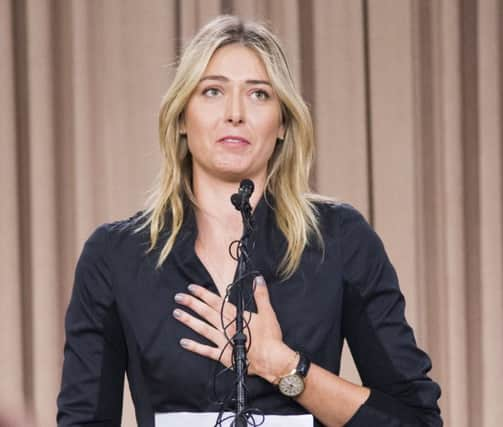Richard Moore: Still losing fight against doping in sport


All very simple, like the old Chewin’ the Fat sketch, where Ford Kiernan and Greg Hemphill would point at people as they passed, delivering a verdict, either “good guy” or “w***.”
Thus, Alain Baxter, the Scottish skier stripped of his 2002 Olympic medal after mistakenly using an inhaler with a banned product, is a bad guy. And Dan Stevens, believed to be the whistleblower behind the latest doping exposé, revealed last week in the Sunday Times, is a good guy.
Advertisement
Hide AdAdvertisement
Hide AdIt isn’t always black or white, but the second case raises another question: is whistleblower always the correct term? Are all whistleblowers equal? Stevens was an amateur cyclist who, it is alleged, was given a banned substance by Dr Mark Bonar, who, it is further alleged, claimed he treated “150 top sports stars” including footballers from Arsenal, Leicester City and Chelsea, as well as cricketers, boxers and British Tour de France cyclists.
It’s a great headline that might ignore an inconvenient truth: that the information provided by a whistleblower is only as good as the source is credible. Even if they’re credible, they might not pass the “good guy” test. Floyd Landis was credible when he revealed the extent of Lance Armstrong’s doping, even if his categorisation is problematic, since his motivation was revenge and self-interest.
Yuliya and Vitaly Stepanov are in another category: credible whistleblowers who revealed what appeared to be state-organised doping in their native Russia and did so at great personal risk, subsequently having to leave the country for their safety.
Since the Stepanovs’ allegations Russian sport has been a house of cards. Almost every day brings a new Meldonium positive. This week the entire under-18 ice hockey team was replaced, prompting speculation in the Russian media that they had all taken a drug placed on the banned list on 1 January, which has now accounted for 158 positives, 30 of them Russians. They include an Olympic gold medal winning speed-skater, a four-time world swimming champion, cyclists, gymnasts and a high-profile tennis player in Maria Sharapova. The Chewin’ the Fat verdict on Russian sport would be clear: not good guys. Or in the language of the World Anti-Doping Agency: non-compliant. Which is why UK Anti-Doping (UKAD), on the instruction of the World Anti-Doping Agency (WADA), took over drug-testing in Russia.
So, UKAD? Good guys. But wait. In the case of Dr Bonar, UKAD has been criticised for not properly investigating Stevens’ allegations. An independent review has now been launched, led by Andy Ward, a former policeman with experience of serious organised crime, counter-terrorism and the use of intelligence.
I’m not sure what the Russian is for schadenfreude but the Dr Bonar story and resulting review prompted a tweet from the Russian embassy: “Evidence of doping in British sports mounting, investigation should avoid double standards.” Which was amusing (Russian embassy? Good guys) if we ignore the fact that on the one hand we have the alleged collusion of the state in doping athletes, and, on the other, a rogue doctor who – on evidence apparently supplied by an amateur sportsman hoping to have his ban reduced – treated unnamed top sportspeople.
In the absence of names, the Bonar story focused on UKAD’s alleged failings, but this is part of a wider trend. If the erosion of trust in professional sport began long ago, a more recent phenomenon has been a loss of faith in the anti-doping movement.
Corrupt officials and inadequate labs have contributed to this, but there is also a perception that some agencies, even WADA itself, are toothless, overly bureaucratic and too focused on old-fashioned testing, which has proved a blunt, largely ineffective instrument. Thousands of blood and urine samples are collected at great expense and about 2 per cent are positive – a figure nobody believes is a true reflection of the prevalence of doping.
Advertisement
Hide AdAdvertisement
Hide AdIt is an alarming trend. If we can’t be sure whether the anti-doping authorities are “good guys” – or at least properly resourced and fully committed – then where does that leave us?
One critic is Renée Anne Shirley, former executive director of the Jamaican anti-doping commission and herself a whistleblower, having gone public over the failings of her own agency in 2013. It is easy to criticise, less easy to come up with solutions, so I asked Shirley what she would do if she were Craig Reedie, the Scot who now heads WADA.
She replied with a four-point plan, urging Reedie to “step out of the confines of the walls of WADA and [the] IOC and go talk with athletes” and whistleblowers; suggesting that “the Meldonium issue presents him with a chance to show leadership”; while “the Bonar issue provides an opportunity to look at investigations and data-sharing/data privacy”; and, finally, that in “more advanced sporting countries”, including Kenya, Ethiopia and Jamaica, much more work needs to be done to improve anti-doping.
In its early days, led by the combative and outspoken Dick Pound, the great hope was that WADA would radically change the landscape and shake up the sporting establishment. Now, at least according to people like Shirley, it has become part of it. “By appointing from within, WADA is just preserving the status quo and same ole, same ole,” she says. “Don’t get me wrong, the guys are good people, but they are not in my opinion going to bring anything new to the table or thinking outside the box.
“WADA is now kind of like the UN in how it operates,” she continues. “This suits the IOC and sport. Lots of conferences, PR spin and photo op sessions, while the statistics show that we are no closer to winning the fight against doping in sport.”